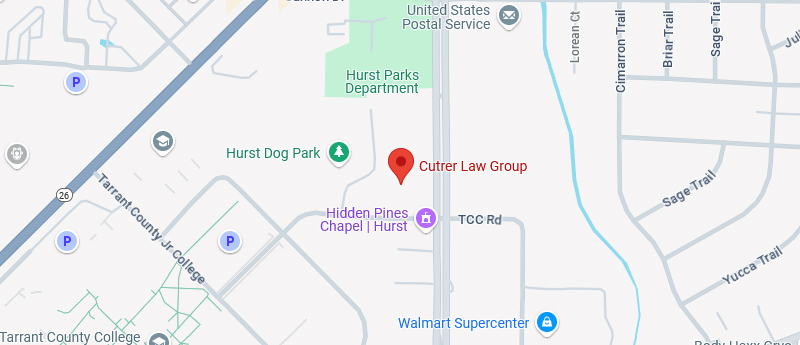Bedford Guardianship Lawyer
Assisting Clients in Tarrant and surrounding counties, Texas
One of the most difficult decisions a family can make is to take over the care and legal guardianship of a loved one who can no longer care for themselves or make sound legal and financial decisions. Guardianship is a court-ordered relationship that takes one person’s legal rights away (the ward) and awards them to another person (the guardian). This most often happens with adults who are incapacitated. Legal incapacity means that a person has a physical or mental condition that leaves them unable to provide for their own food, clothing, or shelter, care for their own physical health, or to manage their financial affairs. There are two types of guardianship in Texas: a guardian of the person has control over the ward’s personal matters, such as housing, medical, and educational decisions, while a guardian of the estate has control over the ward’s property and finances. These may both be the same person, or they may be different people.
When a loved one cannot care for themselves, sometimes another person has to step in to ensure that their physical safety is ensured and their financial and legal affairs are well managed. Guardianship is a last resort, only granted if the person is truly in danger, whether physically or financially, without a guardian in charge.
If you have a loved one who needs help to manage their health, finances, and legal affairs, contact Anita K. Cutrer, Attorney at Law, today at 817-854-1651 to discuss your options.
Are There Alternatives to Guardianship?
Sometimes there are less drastic methods than guardianship to ensure the health and safety of a loved one.
Power of Attorney
One example is the power of attorney. This legal document gives one person the legal right to act on behalf of another. A power of attorney, however, has to have been created before the person became incapacitated, while they were still able to make sound decisions about their finances and legal affairs.
Representatives for Government Assistance Programs
In certain cases, the Social Security Administration, or SSA, allows a person’s benefits to be sent to a representative payee regardless of incapacity, which may make guardianship unnecessary. Similarly, a family member can act as the authorized representative of an incapacitated person in order to receive food stamps, TANF, and Medicaid for that person.
Emergency Decisions for Incapacitated
Finally, a family member can make decisions for another person in emergency situations in which they are in the hospital or a facility and are unable to communicate.
Are Disability and Incapacity the Same Thing?
Disability and incapacity are not the same things. A disabled person has certain activities that they are unable to perform. If these are the basic necessities of life and the person is willing to accept appropriate help from others, such as home health care or placement in a skilled nursing facility, for example, the person is not incapacitated and no guardianship is necessary.
If a person is disabled and will not accept any help with the activities of daily living that they are unable to perform on their own, this may be deemed incapacity. Incapacity means that the person cannot function in a reasonable way, whether physically, financially, or legally. They may not have the mental capacity to make good decisions or to understand legal agreements, or they may be unable to communicate, for example.
What Are the Steps of the Guardianship Process in Texas?
Hiring an Attorney
To begin the guardianship process, hire an attorney. While you may represent yourself in court, only a licensed attorney can represent another person. Your attorney will file the guardianship application with the county court.
Evaluation of the Proposed Ward
A doctor must evaluate the proposed ward. If the evaluation confirms incapacity, the guardianship process moves forward.
Serving and Notifying Interested Parties
The proposed ward must be personally served with the application, and relatives or interested parties must be notified.
Appointment of an Attorney Ad Litem
The court appoints an attorney ad litem to protect the proposed ward’s interests during the process.
Court Hearing
The proposed guardian and ward attend a court hearing unless the ward is excused due to medical reasons. The guardian must demonstrate why the guardianship is necessary.
Approval and Guardian’s Oath
If approved, the guardian has 20 days to sign an oath and post a bond, committing to their duties.
Letters of Guardianship
The court clerk issues “Letters of Guardianship,” valid for 16 months. The guardian must file annual reports and renew the bond to continue serving. Guardians who fail to meet their obligations or violate their oath can be removed by the court.
Why is Anita K. Cutrer, Attorney at Law, Our Best Choice in Guardianship Matters?
Attorney Anita Cutrer is Board Certified in Family Law by the Texas Board of Legal Specialization and has practiced family law for more than 20 years. Ms. Cutrer works closely with families to help them resolve their family law issues as compassionately and efficiently as possible, with an eye toward minimizing conflict whenever possible. Attorney Cutrer accepts family law cases only in Tarrant and surrounding counties, Texas. Focusing her practice both on topic and on geography benefits her clients, as she has a comprehensive understanding of both family law and of the Tarrant and surrounding counties court system.
Contact the office of Anita K. Cutrer, Attorney at Law, at 817-854-1651 for a consultation.


 1845 Precinct Line Road
1845 Precinct Line Road info@akcfamilylaw.com
info@akcfamilylaw.com 817-854-1651
817-854-1651



